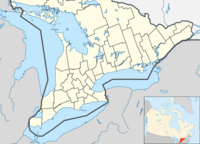Neyaashiinigmiing 27
Neyaashiinigmiing | |
|---|---|
| Neyaashiinigmiing Indian Reserve No. 27 | |
| Coordinates: 44°55′N 81°02′W / 44.917°N 81.033°W | |
| Country | |
| Province | |
| County | Bruce |
| First Nation | Chippewas of Nawash |
| Area | |
| • Land | 63.84 km2 (24.65 sq mi) |
| Population (2016) | |
• Total | 615 |
| • Density | 9.6/km2 (25/sq mi) |
| Website | www.nawash.ca |
Neyaashiinigmiing, formerly Cape Croker,[1] is a reserve within Bruce County, Ontario. It is one of the parcels of land administered by the Chippewas of Nawash Unceded First Nation.
Etymology
[edit]The name Neyaashiinigmiing loosely translated from Ojibwe as point of land surrounded on 3 sides by water. Which describes the location of Neyaashiinigmiing 27.[2]
Points of interest
[edit]
Cape Croker Lighthouse
[edit]The Cape Croker Lighthouse is located on the south-east corner of Neyaashiinigmiing. It was first built in 1898, but was replaced in 1902 with the current lighthouse. The lighthouse was the first of its type and was the first to have an electrically ran light and foghorn. The lighthouse is an octagonal lighthouse, with a height of 18 meters/53 feet. The original lighthouse was a wooden lighthouse. The lighthouse has a fresnel light and its range is 24 km.[3][4]
Cape Croker Park
[edit]Cape Croker Park is a 520-acre park located in Neyaashiinigmiing. Surrounding Sydney Bay. It offers camping and hosts the annual pow-wow.[5]
Bruce Trail
[edit]The Bruce Trail goes through Neyaashiinigmiing and on some of the bluffs on Neyaashiinigmiing.[6]
Others
[edit]The reserve Neyaashiinigmiing is also home to two bluffs the Jones Bluff and the Sydney Bay Bluff, the Bruce trail goes on both of the bluffs.
Demographics
[edit]| 2021 | 2016 | 2011 | |
|---|---|---|---|
| Population | 580 (-5.7% from 2016) | 615 (-7.8% from 2011) | 667 (12.9% from 2006) |
| Land area | 63.76 km2 (24.62 sq mi) | 63.84 km2 (24.65 sq mi) | 63.81 km2 (24.64 sq mi) |
| Population density | 9.1/km2 (24/sq mi) | 9.6/km2 (25/sq mi) | 12.5/km2 (32/sq mi) |
| Median age | 44 (M: 40.8, F: 50) | 37.7 (M: 36.2, F: 39.0) | n/a (M: n/a, F: n/a) |
| Private dwellings | 250 (total) | 410 (total) | 351 (total) |
| Median household income | $29,568 |
References
[edit]- ^ Canada, Library and Archives (1857). "Plan showing the subdivision of the Cape Croker Indian Reserve No. 27, Georgian Bay. / Edwin Henry Kertland, D.L.S". recherche-collection-search.bac-lac.gc.ca. Retrieved 2023-04-09.
- ^ "Cape Croker Park". No. 34th (annual pow wow). Chippewas of Nawash First Nation: Cape Croker Economic Development. 2018.
- ^ "Cape Croker Lighthouse (Neyaashiinigaaming) « Bruce Coast Lighthouses in Ontario". www.brucecoastlighthouses.com. Retrieved 2018-08-20.
- ^ "Cape Croker Lighthouse |Cape Croker, ON". Retrieved 2018-08-20.
- ^ "Cape Croker Park Ontario | Home". www.capecrokerpark.com. Retrieved 2018-08-20.
- ^ "Cape Croker Park". No. 34th (annual pow wow). Chippewas of Nawash First Nation: Cape Croker Economic Development. 2018.
- ^ "2021 Community Profiles". 2021 Canadian census. Statistics Canada. February 4, 2022. Retrieved 2022-04-27.
- ^ "2016 Community Profiles". 2016 Canadian census. Statistics Canada. August 12, 2021. Retrieved 2021-07-20.
- ^ "2011 Community Profiles". 2011 Canadian census. Statistics Canada. March 21, 2019. Retrieved 2021-07-20.

